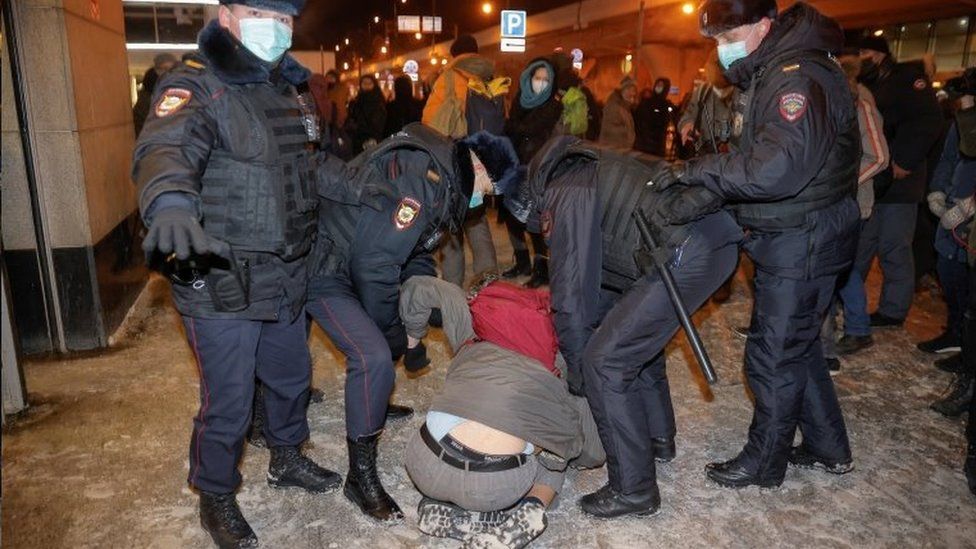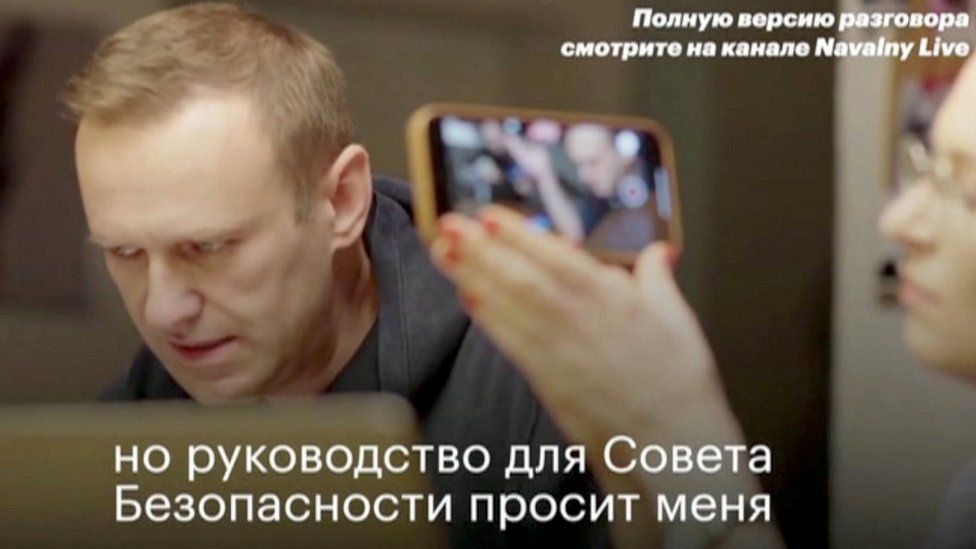“Alexei Navalny: EU and US demand release of poisoned Putin critic”, BBC News
London, Moscow, 18 January 2021
The United States and several European governments have demanded the release of opposition politician Alexei Navalny from Russian detention.
Mr Navalny, 44, was detained soon after his flight from Germany landed in Moscow on Sunday.
He was returning to the country five months after he was almost killed in a nerve-agent attack he blamed on the Kremlin. Moscow has denied involvement.
Russia’s foreign minister dismissed the international condemnation.
Sergei Lavrov said Western politicians were using it as a way to “divert attention” from domestic problems.

Alexei Navalny – The basics
- Mr Navalny is an anti-corruption campaigner and the most prominent face of Russian opposition to President Vladimir Putin, whose party he says is full of “crooks and thieves”
- He attempted to stand in the 2018 presidential race, but was barred because of an embezzlement conviction that he says was politically motivated
- An outspoken blogger, he has millions of Russian followers on social media and managed to get some supporters elected to local councils in Siberia in 2020

Russia’s prison service on Sunday said the Kremlin critic had violated the terms of his suspended sentence for embezzlement, and that he would remain in custody until a court ruling.
Mr Navalny’s team said a court hearing was organised on Monday at a police station on the outskirts of Moscow. In a video released by his spokeswoman, Mr Navalny described the hearing as “lawlessness of the highest grade”.
What has the international reaction been?
The US and European Union have led calls for Mr Navalny to be freed, but have stopped short of threatening any punitive action.
US Secretary of State Mike Pompeo said the Russian authorities were trying to silence their critics. He called for Mr Navalny’s “immediate and unconditional release”.
“Confident political leaders do not fear competing voices, nor commit violence against or wrongfully detain political opponents,” Mr Pompeo said.
US President-elect Joe Biden’s incoming national security adviser stuck a similar tone, saying: “The Kremlin’s attacks on Mr Navalny are not just a violation of human rights, but an affront to the Russian people who want their voices heard.”
The response from the EU was equally strong, with France, Italy and the president of the European Commission, Ursula von der Leyen, among those issuing demands for his release.
German Foreign Minister Heiko Maas described the arrest as “totally incomprehensible”.
UK Foreign Secretary Dominic Raab said Mr Navalny’s arrest was “appalling” and called for his immediate release.
“Rather than persecuting Mr Navalny, Russia should explain how a chemical weapon came to be used on Russian soil,” he said.
How was he arrested?
When Mr Navalny was poisoned last August and collapsed on an internal flight in Siberia, he was flown to Germany for emergency medical treatment. As he recovered, he said he intended to return to Russia. On Sunday, he made good on that pledge, boarding a Pobeda Airlines flight in Berlin despite warnings he would face arrest on landing.
The plane was packed with journalists, including from the BBC Russian Service. Shortly before landing, the pilot announced that for “technical reasons”, the plane was being diverted from Vnukovo airport, where thousands of Navalny supporters had gathered, to Sheremetyevo airport, causing a stir among the passengers.

‘He told us he was not afraid’
Liza Shuvalova, BBC News
There had always been a feeling Flight DP936 from Berlin to Moscow with Alexei Navalny onboard would not go according to plan.
So when the captain announced that the plane would be diverted to a different airport, Mr Navalny shouted his apology to everyone onboard, many of whom were journalists.
After a ride in a bus from the plane to the airport, he told us he was not afraid and was very happy to return home.
As he approached passport control with his wife Yulia, he said to the border control officer with a smile: “You must have been waiting for me for a long time!” And it was probably true.
A few moments later, he was asked by policemen to accompany them or they would have to use “force”. Mr Navalny wanted his lawyer Olga Mikhailova – who was on the same flight – to go with him. But at that point, she had already crossed the border and was not allowed back airside as Mr Navalny was led away.

The activist was later taken to a police station in Moscow, where he spent the night.
In a statement late on Sunday, Russia’s prison service said the opposition leader “had been wanted since 29 December 2020 for repeated violations of the probation period”. It added that he would remain in custody until a court decision.
 IMAGE COPYRIGHTREUTERS
IMAGE COPYRIGHTREUTERSThe authorities accuse him of violating conditions imposed after a conviction for embezzlement, for which he received a suspended sentence. He has always said the case was politically motivated.
Separately, Russian prosecutors have launched a new criminal case against Mr Navalny on fraud charges related to transfers of money to various charities, including his Anti-Corruption Foundation.
The activist accuses Mr Putin of targeting him with spurious cases.


The Russian authorities often make out that Alexei Navalny isn’t popular with the Russian people, that he’s no threat to President Putin.
But his return home five months after being poisoned sparked a major police operation on Sunday.
In chaotic scenes, riot police pushed Mr Navalny’s supporters out of the arrivals hall of Vnukovo airport, before the flight was rerouted.
Last summer, Russia’s most prominent opposition figure was attacked in Siberia allegedly by an undercover hit squad of Russian security agents.
His decision to return home is a direct challenge to Vladimir Putin – and creates a dilemma for the Kremlin.
It risks turning him into a political martyr, a Nelson Mandela-like figure, and sparking more Western sanctions.
Do nothing and the Kremlin’s fiercest critic will almost certainly be a thorn in its side in an important election year.

What happened to Navalny last year?
In August, he collapsed on a plane flying from Tomsk in Siberia to Moscow. The pilot diverted the flight to the city of Omsk, where Mr Navalny was admitted to hospital. Two days later, Russian officials allowed him to be airlifted to Germany in an induced coma.
European experts later said he had been poisoned with the extremely toxic chemical weapon Novichok, developed by Soviet scientists in the Cold War.
He was released from a hospital in Berlin in September to continue his recuperation.
Last month, investigative reporters named three agents of Russia’s FSB security service who had travelled to Tomsk at the time Mr Navalny was there, and said the specialist unit had tailed him for years.
 IMAGE COPYRIGHTREUTERS
IMAGE COPYRIGHTREUTERSMr Navalny then duped an FSB agent named Konstantin Kudryavtsev into revealing details of the operation against him in a phone conversation which he recorded and posted online. The agent told him that the Novichok used to poison him had been placed in his underpants.
President Putin has dismissed investigations by the Bellingcat website and other groups that have blamed Russian intelligence agents for the attack as “a trick”. He has alleged his rival is backed by US intelligence services.